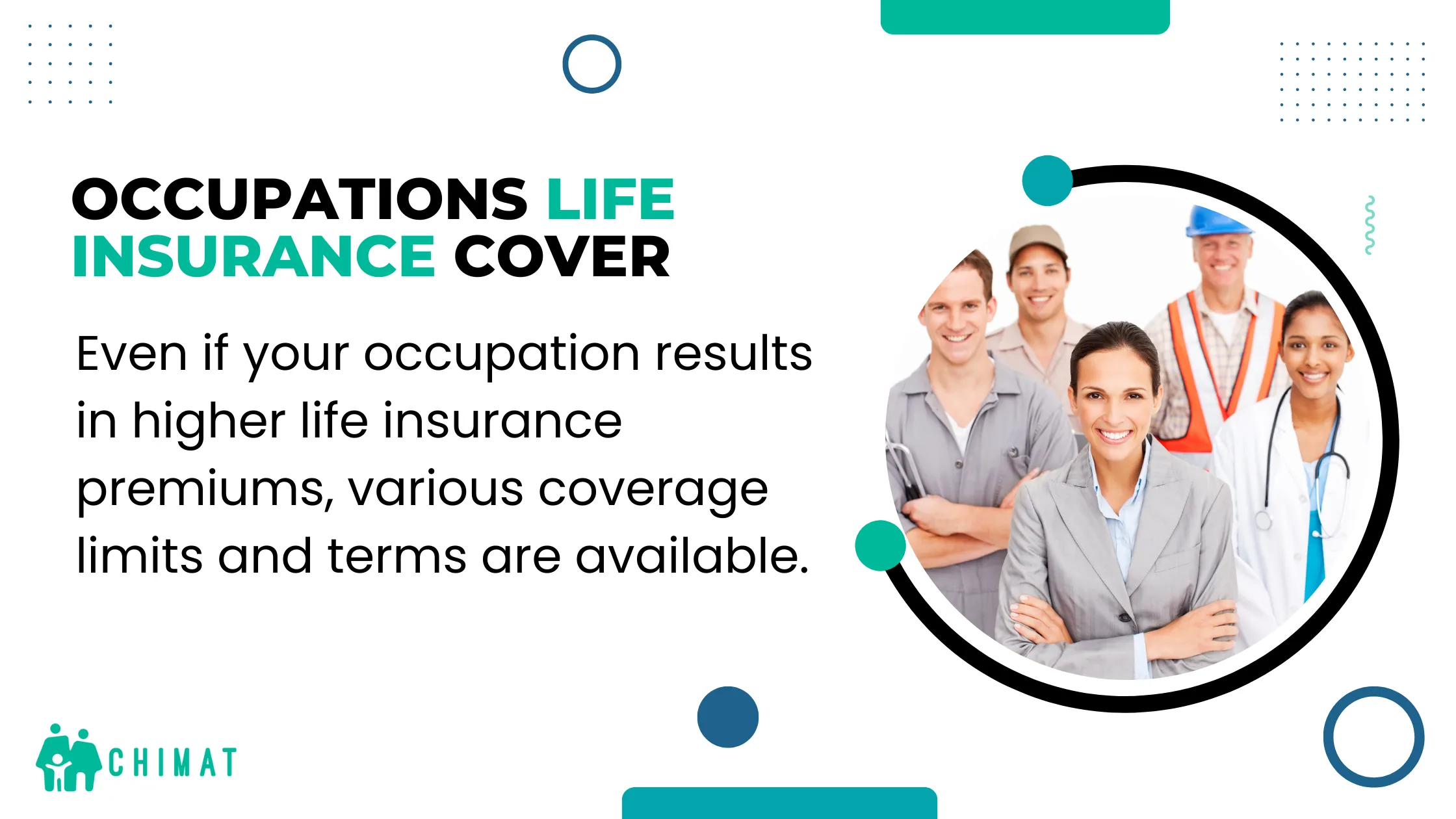
Are you wondering if your job influences how much you pay for life insurance? Many people share this valid concern.
This guide sheds light on this topic, explaining how careers shape life insurance policies and premiums.
Some important points to think about:
- Your job plays a crucial role in determining your life insurance premiums. Careers seen as high-risk, such as firefighting or construction work, can lead to slightly higher costs for cover than jobs with fewer risks.
- Life insurance applications require information about your lifestyle and health. Honesty about activities like smoking, exercise habits, and any medical history is essential since these factors significantly impact your premium rates and coverage possibilities.
- We work with companies offering various life insurance options catering to diverse needs. From decreasing term life insurance, which is ideal for covering debts like mortgages, to critical illness coverage, it provides support during severe health challenges.
- Aside from financial protection, the providers we work with enhance their policies with bonuses such as gift cards and estate-planning tools, enhancing the value of their offerings while providing peace of mind and convenience for policyholders.
- Safety measures at work and living a healthy lifestyle can positively influence your life insurance terms. Even if you are in a high-risk occupation, adopting safe practices could help lower your premiums.
Quick And Easy Life Cover Whatever Your Occupation – Get Your Cheapest Quotes Now


The Impact of Career on Life Insurance
Our jobs can affect how much you pay for life insurance. Jobs that involve more danger may lead to higher payments for cover.
Health and lifestyle questions in life insurance applications
Insurers ask health and lifestyle questions to determine the risks of offering you a life insurance policy.
They want to know about any pre-existing health conditions, your medical history, and how you live your day-to-day life.
Click To Compare QuotesThis helps them decide if they can insure you and at what premium. For example, suppose someone has a job that involves heavy physical work or potential exposure to hazardous materials.
In that case, this person might face higher insurance premiums than someone with a less risky occupation.
Getting life insurance means sharing details like whether you exercise, smoke, or have had serious illnesses in the past.
I once went through this process and found myself answering questions I hadn’t anticipated – like my weekly exercise routine and any family history of diseases.
These inquiries give insurers a clear picture of our health risks. So, for anyone applying for an insurance policy, be prepared: honesty is crucial here as it affects approval chances and how much we pay for coverage.
Consideration of career in risk assessment
Choosing a career has important implications for life insurance. Life insurance companies evaluate the risks associated with different professions.
High-risk jobs like firefighters and roofers often face more questions during the application process.
They might also pay higher premiums for their policies. This is because these roles have greater exposure to hazards that could lead to early death or serious injuries.
Professions deemed low-risk, such as office workers, usually enjoy lower monthly premiums on their life insurance.
This difference in premiums between high-risk and low-risk occupations reflects the level of risk that an insurer takes by providing coverage.
Making intelligent choices about safety equipment and healthy living can also impact these assessments, potentially lowering costs even in high-risk fields.
I learned this first-hand when applying for my own policy; answering detailed questions about my day-to-day responsibilities made me aware of how closely insurers examine our careers to determine our rates.
High-risk jobs may require additional questions and higher premiums
Working in high-risk professions, like firefighting, offshore work or being an HGV driver, can lead to insurance companies asking more questions during the application process. This is because such jobs carry greater risks of workplace injuries or death.
Insurers need detailed information about your job duties and any protective equipment used to assess the level of risk involved accurately.
Click To Compare QuotesAs a result, individuals in these occupations might see higher life insurance premiums than those in less risky fields.
Insurance companies set premiums based on their likelihood of paying out a claim. Jobs that expose employees to dangers not found in typical office environments automatically signal a higher risk for insurers.
For example, firefighters face potential burns and smoke inhalation regularly while ambulance drivers navigate through heavy traffic under time pressure, increasing their chances of collisions.
These occupational hazards mean that workers will often pay more for life insurance coverage as their day-to-day responsibilities increase the likelihood of filing an insurance claim sooner.

Comparison of Risk Between Different Occupations
It’s key to see how risks differ in various fields to understand insurance costs.
Jobs like construction or military roles are more hazardous and can lead to higher premiums. This is because the dangers of the job are also higher.
| Occupation | Risk Level | Typical Premium Difference (%) |
|---|---|---|
| Construction Worker (Roofer) | Higher | +20% |
| Office Manager (Construction Company) | Lower | Baseline |
| Police Officer | Higher | +20% |
| Professional Fisherman | Higher | +20% |
| Van Driver | Moderate | +10% |
| Members of the fire service | Higher | +12% |
| Electrical contractor/Electrician | Low/Moderate | Standard/+10% |
Importance of insurance for peace of mind in high-risk job roles
As we learn that high-risk jobs often face higher insurance premiums, it becomes clear why peace of mind is paramount for those in such roles.
For someone working at great heights or handling heavy vehicles, the risk isn’t just a daily challenge— it’s a constant companion.
Life insurance shifts from an option to a necessity, offering financial security and emotional comfort.
Those in high-risk occupations find solace in knowing their families won’t bear financial burdens alone if something happens.
Click To Compare QuotesDrawing on experiences shared by HGV drivers and construction workers, the impact of having whole life policies or term life insurance is significant.
One driver shared how understanding his employer provided death benefits through group life insurance eased his worries immensely.
It allowed him to focus on safety rather than what would happen to his mortgage or family’s livelihood after he was gone.
This reassurance is crucial, considering the daily dangers faced in environments with elevated health and safety risks.
Insurance providers play a critical role by assessing these job-related risks and setting terms that ensure individuals can access adequate coverage without facing insurmountable costs.

Types of Life Insurance Available
Various plans are available to safeguard your future, catering to different needs and situations.
This choice allows you to find the right protection to cover debts or ensure your loved ones have financial security in tough times.
Decreasing term life insurance for covering large debts
Decreasing term life insurance is a smart way to cover large debts, such as a mortgage. This type of insurance gets cheaper over time because the amount it pays out decreases as you pay off your debt.
For example, if a 30-year-old non-smoker chooses this insurance, they could get coverage worth £210,000 for 20 years at less than £6 per month. This makes it affordable and practical for anyone looking to ensure their family’s future financial stability.
Decreasing term life insurance offers peace of mind for people worried about leaving behind debts for their loved ones.
It aligns with reducing loan balances, meaning you won’t be paying for more coverage than you need as your debt lowers.
I chose this option when buying my first home. The thought of my family being burdened by remaining mortgage payments in case something happened to me was unsettling.
Having this protection in place means I rest easier knowing they won’t have that worry.
Level term life insurance for fixed payouts
Moving from the idea of decreasing term life insurance, which is great for covering debts that shrink over time, we step into the territory of level term life insurance.
This type provides a fixed lump sum to your loved ones if you pass away within a set period, such as 25 years.
For example, if you secure a policy with £100,000 cover and unfortunately die ten years in, your family will receive the same amount as if you passed twenty-four years in.
Level term life insurance stands out because it offers peace of mind through stable payouts. You know exactly how much your beneficiaries will get — there’s no guessing involved.
It simplifies planning for the future and takes one worry off your shoulders.
Plus, with features like whole-life coverage from reputable insurers, this option becomes even more attractive for those looking to ensure their family’s financial security without dealing with complex terms or fluctuating benefits.
A fixed payout means no surprises during difficult times.
Critical illness cover for serious conditions
Critical illness cover supports you financially if you face serious illnesses like cancer, heart attacks, or strokes.
This insurance is crucial as it offers peace of mind, knowing you have a financial safety net.
If a severe health issue strikes, this cover helps manage the costs not covered by regular health insurance, such as living expenses and treatments unavailable on the NHS.
Many who have purchased critical illness insurance share stories of how it helped them through tough times. They could focus on recovery without worrying about finances.
The straightforward claim process ensures quick and efficient support during stressful periods.
With employers and employment changing rapidly, having your own cover means continuous protection regardless of job changes or pre-existing conditions that might affect new insurance opportunities with other insurers.
Being Certain About Your Families Needs
Your job and life insurance are closely linked. It’s crucial to see how your job affects the life insurance you get. The cover meets the risks for high-risk jobs, such as firefighting or piloting.
Always be honest to avoid claim rejections. Provide correct information on your health and habits, like smoking. Keeping your information up-to-date matters a lot. This ensures your family gets the support they need.
The type of work you do and how you live both impact insurance. Comparing offers from different companies can help you get better deals.
Make sure to keep your info accurate. This maintains a strong level of insurance against life’s surprises.
FAQs
1. Does what I do for a living change how much I pay for life insurance?
Yes, your job can increase or decrease the cost of your life insurance. Insurance companies consider your job’s risk when deciding on the price.
2. Can getting life insurance be easier if my work offers something called a death-in-service benefit?
Yes. If your employer provides a death-in-service benefit, you’re covered by their policy, which could make getting personal life insurance cheaper and simpler.
3. If I have a serious illness, will my occupation affect my ability to get life insurance?
Your job won’t usually impact your chances of getting coverage for terminal illnesses directly; however, the terms might vary based on the overall risk profile assessed by the insurer.
4. Are there other types of insurance that consider my job an essential factor?
Like with life coverages, car insurers also consider what you do for a living when setting premiums because some occupations are considered higher risk than others.

